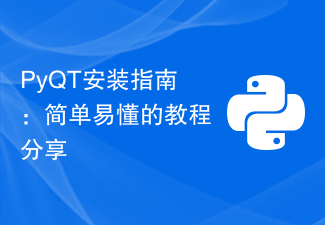
How to master the use of PHP8 extensions by writing practical code
Introduction:
PHP (Hypertext Preprocessor) is a widely used open source script Language, commonly used for writing web applications. With the release of PHP8, new extensions and features enable developers to better meet business needs and improve code efficiency. This article will introduce how to master the use of PHP8 extensions by writing practical code.
1. Understand PHP8 extensions
PHP8 introduces many new extensions, such as FFI, JIT, Attributes, etc. Before writing practical code, we need to understand the basic concepts and usage of these extensions in order to better apply them.
- FFI (Foreign Function Interface): The FFI extension allows PHP to call C language functions and access C language data structures, which provides us with the ability to interact with system-level functions and libraries.
- JIT (Just-In-Time Compilation): JIT is an important feature of PHP8. It compiles PHP bytecode into machine code to improve the execution speed of the code.
- Attributes: Attributes is a metadata mechanism that allows us to add key information to classes, methods, and properties for interpretation and use at runtime.
2. Write practical code
Below we will show how to use PHP8 extension by writing practical code. The following sample code will demonstrate the usage of FFI, JIT and Attributes.
- Use FFI to call C language functions
/**
* 使用FFI调用C语言函数
*/
$ffi = FFI::cdef("
int printf(const char *format, ...);
", "libc.so.6");
$ffi->printf("Hello, %s!
", "PHP");The above code calls the printf function in the C standard library through FFI and outputs "Hello, PHP!".
- Use of JIT
/**
* JIT的使用
*/
ini_set('opcache.jit', '123456');
var_dump(opcache_get_status()['jit']);The above code demonstrates how to set JIT parameters through the ini_set function and how to use the opcache_get_status function to obtain the status of the JIT.
- Use of Attributes
/**
* Attributes的使用
*/
#[Attribute]
class Author
{
public function __construct(public string $name)
{
}
}
#[Author('Alice')]
class Book
{
#[Author('Bob')]
public string $title = 'PHP8扩展编程';
#[Author('Eve')]
public function getTitle(): string
{
return $this->title;
}
}
$reflectionClass = new ReflectionClass(Book::class);
$reflectionProperty = $reflectionClass->getProperty('title');
$attribute = $reflectionProperty->getAttributes(Author::class)[0];
var_dump($attribute->newInstance()->name);The above code defines an Author attribute and applies the attribute to the Book class and its title attribute and getTitle method. Through ReflectionClass and ReflectionProperty, you can obtain the property instance of the property at runtime and perform corresponding operations.
Conclusion:
By writing practical code, we can better understand and master the use of PHP8 extensions. This article introduces the basic concepts and usage of FFI, JIT and Attributes, and demonstrates their practical application through sample code. It is hoped that readers can learn and apply PHP8 extensions in depth by writing practical codes to improve development efficiency and code quality.
The above is the detailed content of How to master using PHP8 extensions by writing practical code. For more information, please follow other related articles on the PHP Chinese website!
 如何使用php扩展DOMPDF生成PDF文件Jul 29, 2023 am 08:30 AM
如何使用php扩展DOMPDF生成PDF文件Jul 29, 2023 am 08:30 AM如何使用PHP扩展DOMPDF生成PDF文件导语:在Web开发中,导出PDF文件是一个常见的需求。DOMPDF是一个功能强大的PHP扩展,可以将HTML文档转换为PDF文件。本文将介绍如何使用DOMPDF扩展来生成PDF文件,并提供一些常用的代码示例。一、安装DOMPDF扩展1.首先,通过以下命令安装DOMPDF扩展:composerrequiredom
 如何通过编写实用代码来掌握 PHP8 扩展的使用Sep 12, 2023 pm 02:39 PM
如何通过编写实用代码来掌握 PHP8 扩展的使用Sep 12, 2023 pm 02:39 PM如何通过编写实用代码来掌握PHP8扩展的使用引言:PHP(HypertextPreprocessor)是一种广泛使用的开源脚本语言,常用于编写Web应用程序。随着PHP8的发布,新的扩展和功能使得开发者能够更好地满足业务需求和提高代码效率。本文将介绍如何通过编写实用代码来掌握PHP8扩展的使用。一、了解PHP8扩展PHP8引入了许多新的扩展,如FFI、
 PyQT安装指南:简单易懂的教程分享Feb 19, 2024 am 08:21 AM
PyQT安装指南:简单易懂的教程分享Feb 19, 2024 am 08:21 AM轻松掌握PyQT安装技巧:详细教程分享PyQT是一种流行的PythonGUI库,它提供了丰富的功能和工具,帮助开发者快速而轻松地创建用户界面。PyQT的安装过程可能对于初学者来说有些困惑,本文将详细介绍PyQT的安装方法,并附带具体的代码示例,以帮助读者轻松掌握这一技巧。安装Python和PIP在开始安装PyQT之前,首先需要确保电脑上已经安装了Pytho
 重要的Spring学习内容:了解常用注解的使用指南Dec 30, 2023 pm 02:38 PM
重要的Spring学习内容:了解常用注解的使用指南Dec 30, 2023 pm 02:38 PM学习Spring必备:掌握常用注解的使用方法,需要具体代码示例引言:Spring框架是目前广泛应用于Java企业级应用开发的开源框架之一。在Spring的学习过程中,掌握常用注解的使用方法是非常重要的。本文将介绍几个在Spring开发中常用的注解,并结合代码示例详细说明它们的作用和用法。一、@Component@Component是Spring框架中最
 了解基本数据类型常量的特点和用法Jan 05, 2024 am 09:49 AM
了解基本数据类型常量的特点和用法Jan 05, 2024 am 09:49 AM掌握基本数据类型常量的特点和用法,需要具体代码示例引言在编程语言中,常量是具有固定值的标识符,它们的值在定义时被设定,并且在程序的执行过程中不会被改变。对于基本数据类型常量,其特点和用法的掌握是编写高效、可读性强的代码的基础。本文将介绍四种基本数据类型常量的特点和用法,分别是整型常量、浮点型常量、字符常量和布尔常量。并通过具体代码示例来进一步解释。整型常量整
 运维工程师是否应该掌握Golang?Mar 13, 2024 pm 09:39 PM
运维工程师是否应该掌握Golang?Mar 13, 2024 pm 09:39 PM标题:运维工程师是否应该掌握Golang?近年来,随着云计算和微服务架构的流行,运维工程师的工作范围不断扩大,需要具备更多的技能来应对复杂的运维挑战。在这种情况下,是否应该掌握Golang成为了一个备受争议的话题。本文将讨论运维工程师是否需要掌握Golang,以及掌握Golang对运维工程师的意义,并提供具体的代码示例。首先,我们来探讨一下为什么运维工程师应
 如何学习和掌握C语言编程Mar 22, 2024 pm 05:09 PM
如何学习和掌握C语言编程Mar 22, 2024 pm 05:09 PM【标题】:如何学习和掌握C语言编程,需要具体代码示例C语言作为一种广泛应用的编程语言,在计算机科学领域具有重要地位。掌握C语言编程可以帮助我们更好地理解计算机底层原理,提高程序设计能力。本文将探讨如何有效学习和掌握C语言编程,并提供一些具体的代码示例供读者参考。一、基本概念C语言简介:C语言是一种通用的计算机编程语言,具有高效性和灵活性。学习C语言可以让我们
 掌握ThinkPHP6的事件机制Jun 21, 2023 am 11:51 AM
掌握ThinkPHP6的事件机制Jun 21, 2023 am 11:51 AM随着Web应用程序规模不断扩大,如何更好地处理事件已成为我们开发的关键。ThinkPHP6提供了事件机制,可以帮助我们更好地处理Web应用程序中的事件。事件机制在Web应用程序中的作用事件机制是一种应用程序设计模式,它涉及将应用程序设计为由事件驱动的系统。具体而言,事件是一种“触发器”,当事件发生时,关联的代码将被激活并执行。事件机制在Web应用程序中的作用


Hot AI Tools

Undresser.AI Undress
AI-powered app for creating realistic nude photos

AI Clothes Remover
Online AI tool for removing clothes from photos.

Undress AI Tool
Undress images for free

Clothoff.io
AI clothes remover

AI Hentai Generator
Generate AI Hentai for free.

Hot Article

Hot Tools

EditPlus Chinese cracked version
Small size, syntax highlighting, does not support code prompt function

Safe Exam Browser
Safe Exam Browser is a secure browser environment for taking online exams securely. This software turns any computer into a secure workstation. It controls access to any utility and prevents students from using unauthorized resources.

Dreamweaver CS6
Visual web development tools

SublimeText3 Linux new version
SublimeText3 Linux latest version

mPDF
mPDF is a PHP library that can generate PDF files from UTF-8 encoded HTML. The original author, Ian Back, wrote mPDF to output PDF files "on the fly" from his website and handle different languages. It is slower than original scripts like HTML2FPDF and produces larger files when using Unicode fonts, but supports CSS styles etc. and has a lot of enhancements. Supports almost all languages, including RTL (Arabic and Hebrew) and CJK (Chinese, Japanese and Korean). Supports nested block-level elements (such as P, DIV),






